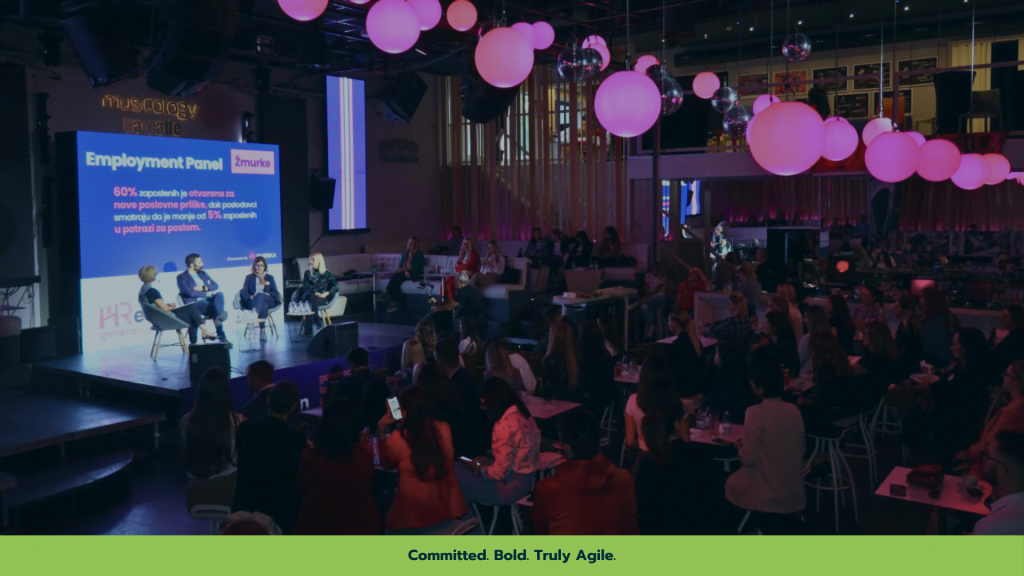Courage, humanity, and honesty are the foundation for improving work culture – with these words, we concluded the panel discussion at the O.U.R. HR conference last October.
When I was invited to be a panelist, I must admit, I didn’t know what to expect. Mainly because, from my perspective, panels have mostly become a tool for “when we don’t have a keynote speaker, we just make a panel.”
This was certainly not the case here. The panel was lively and dynamic, and all the panelists were open and relaxed, yet engaged in serious discussions.
Panel “HRevolution – Generations Through Innovations”
The panel, code-named “Žmurke” (Hide and Seek), was excellently moderated by Jovana Tomić, Senior Partner at CT Legal, and the “headaches” in the discussions were caused by Jovana Uzelac, Head of HR South East Market at Nestlé, Sonja Ćetković, CEO at Infostud, and myself, Nemanja Čedomirović, CEO of Growit Agile.
I say “headaches” because we discussed topics that are not exactly everyday subjects for a room full of HR professionals.
As always, Čedomirović on salary transparency in companies!
When I asked, “Raise your hand if your company has transparent salaries at any level,” how many hands do you think went up? Zero. Zilch. Nada. I didn’t see a single hand. And that isn’t such a bad thing – we simply aren’t there yet.
I’ve already written about this, but I feel like I haven’t written enough, and I’ll continue to explore this topic.
The reason I raised this question wasn’t just to highlight salary transparency for the sake of knowing who earns what – that’s secondary. The primary issue is trust!
- How much do we trust the people we work with?
- How much do we trust the managers to whom we entrust responsibility?
- How much do we trust the leaders from whom we expect to make tough decisions?
Transparency and trust manifest on various levels and in different forms, and salaries are just one of them.
Sonja shared that job ads on Infostud, which include a salary range, perform significantly better and receive far more engagement and applications than those without that information.
Of course! I can only support this even more. Why would I, as a potential employee, waste my valuable time going through 78 steps of the HR/recruitment process without knowing the salary range I can expect?
We all agreed on the panel that officially no one in companies knows others’ salaries, yet unofficially, everyone knows everything! So why the secrecy? We could reduce so much gossip, so many unnecessary discussions, and office politics if we were just a little more honest, open, and brave in our actions and decisions.
Is it possible to introduce transparency in large companies?
Someone will surely say, or at least think (because it’s easier to think than to “grow a pair” and say what we think – another conclusion of the panel), “That won’t work, we’re a large hierarchical organization.”
And my question is: what exactly won’t work?
- Trusting our people?
- Showing them the real situation?
- Being honest in our communication, as Jovana said on the panel?
- Being open?
- Treating each other with humanity?
I would say all of that can work. With moderation, of course – everything needs balance. But the current imbalance in large systems is leading us into a dead end.
To avoid this being just my philosophy, this panel and many other examples around us have inspired me to write this. Below is a list of several global companies that operate humanely, openly, honestly, and transparently.
Even more importantly, as Sonja said:
Companies that strive to create a more people-oriented work environment, not just profit-oriented!
Levels Health
Levels Health has 50 employees, 40 investors, and a current company valuation exceeding 300 million euros, all while operating with complete transparency!
On their website, you can find all their processes: how they work, how they hire, how they run projects, etc. Everything you could imagine about how a company functions is publicly available.
You can even watch video recordings of all their team meetings. Every Friday, they have team meetings, which are later posted online for everyone to see. Wow!
Buffer
With over 200 employees and annual revenues exceeding 20 million euros, Buffer goes a step further than Levels. On their website, at this link, you can see the salaries of all their employees.
Arc
Here’s a company of a completely different type. Arc is a company building a web browser that competes with the giants in that space. I find their approach fascinating because they develop the application entirely in public.
On Arc’s YouTube channel, the CEO openly discusses what they are working on, and their plans, and even engages with the community to shape the product’s direction. If users don’t want a particular feature, the company changes course.
These are just a few of the companies I’ve been following and rooting for, hoping they succeed and demonstrate that transparency is the next big step in the evolution of all companies.
Courage, Humanity, and Honesty in Improving Work Culture
Finally, to return to the beginning. These were the words we used to wrap up the panel discussion, and they are something I will carry forward, both personally and within the companies I work with, whether on a smaller or larger scale.
Now, I just have to wait for next year to see the new panel discussions from the audience, because this experience showed me that panels don’t have to be boring and repetitive.
I’m already looking forward to it!


